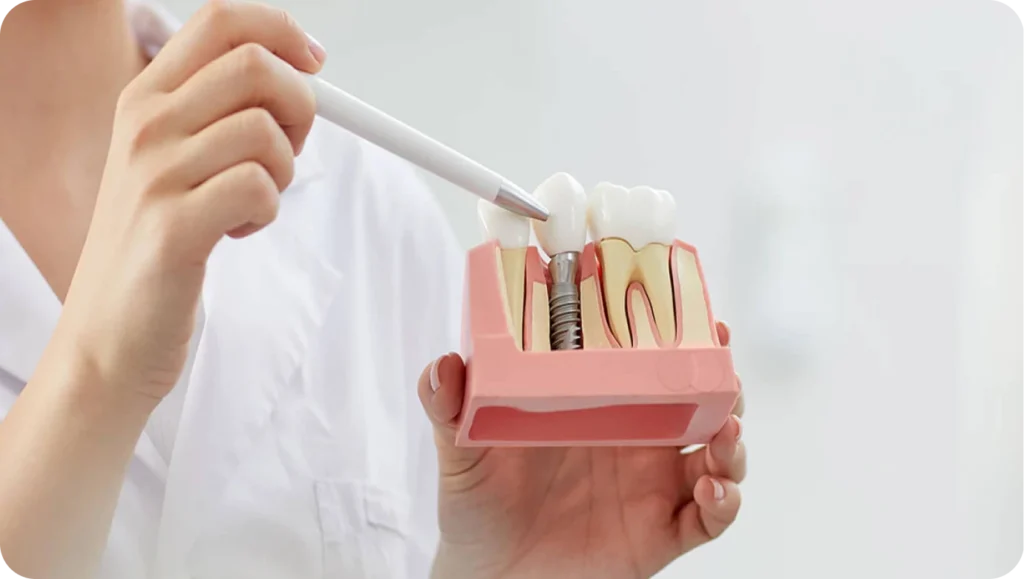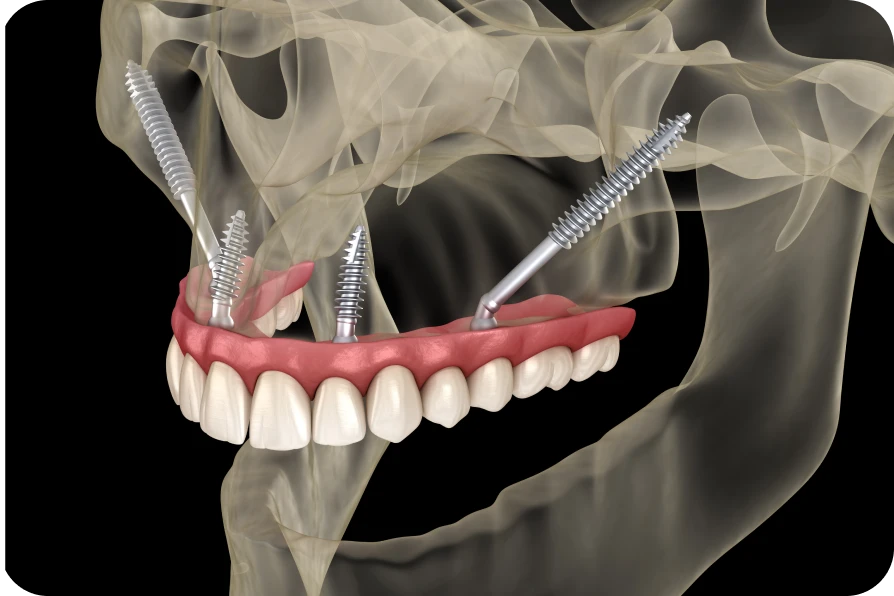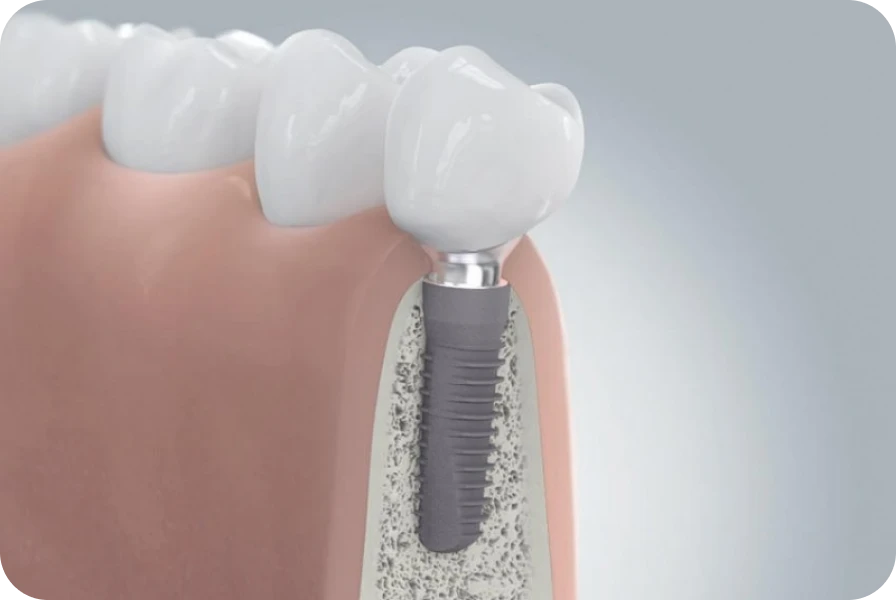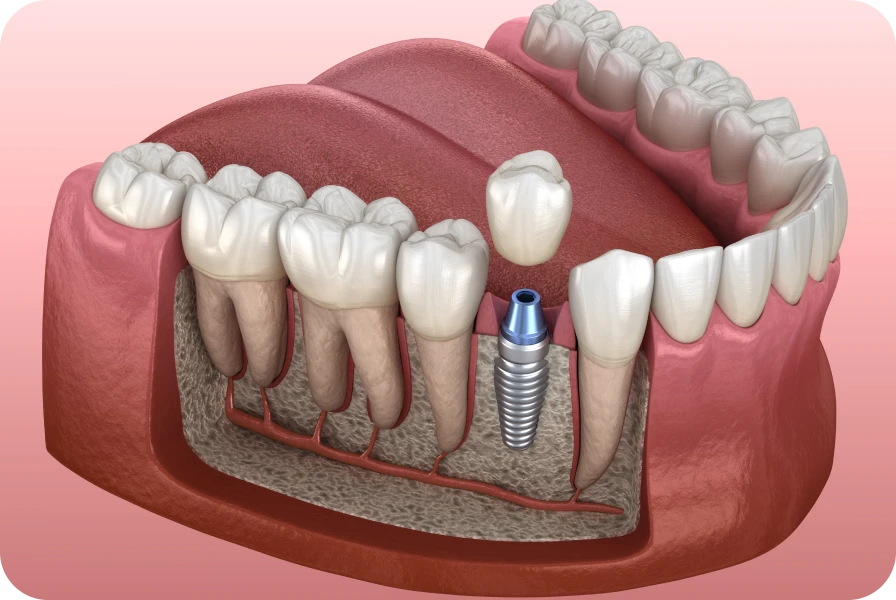Ceramic dental implants
Ceramic dental implants are an increasingly popular option for patients seeking both an aesthetic and functional solution to replace missing teeth.
Main Advantages of Ceramic Dental Implants
- Aesthetics: Ceramic implants have a color similar to natural teeth, which makes them aesthetically more pleasing, especially for visible teeth.
- Biocompatibility: Ceramic is generally well tolerated by the body, which reduces the risk of allergic reactions or inflammation.
- Corrosion Resistance: Unlike metal implants, ceramic implants do not oxidize, which can extend their durability over time.
- Absence of Thermal Conductivity: Ceramic implants do not have thermal conductivity, which can reduce sensations of heat or cold in the mouth.
- Avoidance of Metal Implant Issues: For patients sensitive to the presence of metal, ceramic implants offer a metal-free alternative.
- Antibacterial Properties: Some ceramic materials possess properties that can reduce bacterial growth, thus contributing to better oral health.
- Lower Risk of Discoloration: Ceramic implants are less likely to discolor over time compared to some metals.
It is important to consult a professional to determine if a ceramic implant is the best option based on your needs.

Installation Procedure
“The implant preserves the jawbone by stimulating its growth. Unlike bridges, it does not affect adjacent teeth.”
- First, your dentist conducts an examination to assess the condition of your jawbone.
- If conditions are favorable, the implant is inserted into the bone during a surgical procedure.
- After a healing period of a few months, the crown is attached to the implant. This final step allows you to regain a functional and aesthetic tooth.
Zygomatic Implant
The zygomatic implant is a solution for patients with significant bone resorption in the upper jaw. This implant attaches directly to the zygomatic bone, or cheekbone, offering a viable alternative to bone grafts.
Indications for Zygomatic Implants
The basal implant is ideal for patients with insufficient bone density for traditional implants. It is also suitable for patients suffering from periodontal diseases. This type of implant is resistant to infections due to its fixation in the basal bone, which is less affected by periodontal diseases. Furthermore, the basal implant often allows for immediate loading, thus offering a quick and effective solution.

Treatment Process
Zygomatic implant treatment requires meticulous planning. The dentist conducts thorough examinations, including 3D scans, to assess the quality of the zygomatic bone. The implant is then inserted during surgery under local or general anesthesia. Once the implant is in place, it can support a temporary prosthesis, thus allowing for immediate smile restoration.
Basal Implant
The basal implant is another option for patients with severe bone resorption. This implant anchors into the basal bone, a denser part of the jawbone. It offers a stable and durable solution without bone grafting.


Why Choose a Basal Implant?
The basal implant is ideal for patients with insufficient bone density for traditional implants. It is also suitable for patients suffering from periodontal diseases. This type of implant is resistant to infections due to its fixation in the basal bone, which is less affected by periodontal diseases.
Steps of Basal Implantation
The basal implantation process is similar to that of other implants, but with some differences. After the initial examination, the implant is inserted directly into the basal bone during surgery. This type of implant often allows for immediate loading, meaning you can receive a temporary prosthesis on the same day as the surgery.
Mini-Implant
Mini-implants are smaller versions of traditional dental implants. They are primarily used to stabilize removable dental prostheses or to replace small teeth.
Uses of Mini-Implants
Mini-implants are a quick and minimally invasive solution for stabilizing removable prostheses. They are also used to replace small teeth, such as incisors, in areas where space is limited. Their small size allows for a less invasive procedure, thus reducing healing time.
Mini-Implant Installation
Mini-implant installation is a simple and quick procedure. After a preliminary examination, the dentist inserts the mini-implants into the bone using a minimally invasive technique. The procedure generally does not require sutures, which reduces recovery time. Once the implants are in place, they can immediately stabilize a removable prosthesis, thus improving comfort and masticatory function.
Dental implants offer solutions adapted to each situation, whether you need to replace a single tooth or stabilize a full denture. It is essential to consult your dentist to determine the type of implant that will best meet your specific needs. A precise evaluation and a personalized treatment plan are the keys to a successful dental restoration. By choosing the right solution, you can regain a functional and aesthetic smile, while preserving your long-term oral health.
